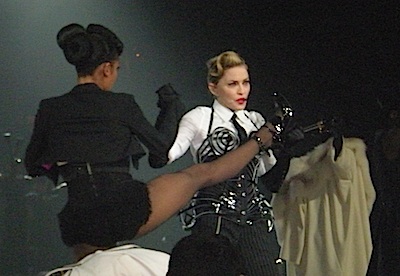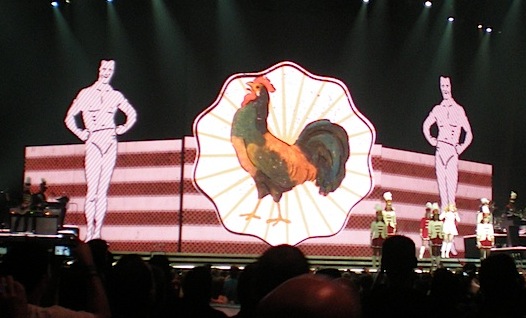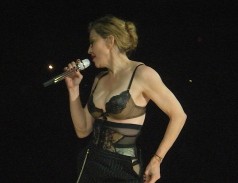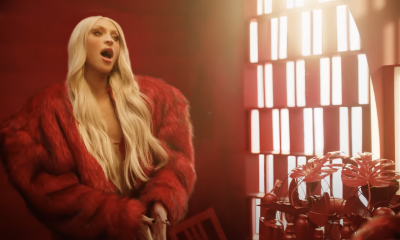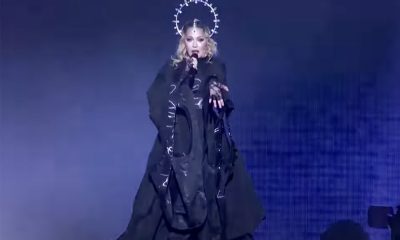Arts & Entertainment
Gay high holy day
Madonna brings ‘MDNA Tour’ to D.C.
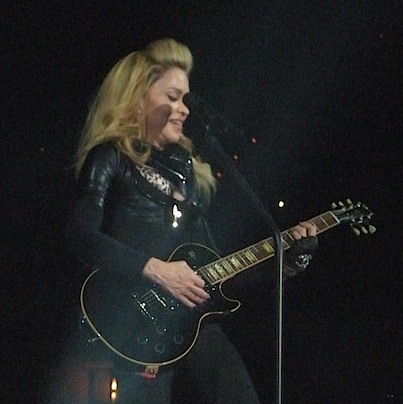
It sounds silly to say unless you were there, but Madonna’s show at the Verizon Center in D.C. last night — her first shows here since 2004 — felt like a wild mix of gay church, homecoming and an eye-popping musical extravaganza that, at times, rivaled a Cirque du Soleil production in scale, scope and special effects.
Though barely anyone sat down the whole night, when the lights came up for a fourth quarter sing-along to “Like a Prayer,” there was an energy and fervor in the room that felt positively spiritual. It wasn’t so much, for me anyway, about the musicianship of the moment. I even winced a time or two at the thin vocals (she deserves credit for singing it live, though!), but that didn’t feel to me the point. In an arena full of what appeared to be about 70 percent gay men, the “Prayer” singalong felt more like a celebration of everything Madonna has always represented — you can be spiritual, intelligent, gay and have fun. And — projecting and paraphrasing of course — the stodgy old anti-gay gatekeepers of the Roman Catholic church, don’t think for a minute it’s their way or nothing. Yes, they’re onto something powerful and timeless, but they’re not the gatekeepers.
Sure, this isn’t a new thing by any means — Madonna has been using religious imagery to powerful concert effect at least since the “Blonde Ambition Tour,” but somehow this time out, it had a freshness and impact that totally worked. Arriving on stage in a confessional booth in one of her best tour entrances ever, this was an evening that brought with it redemptive powers. It’s also one of her best tours in ages — true, a Madonna show is never a bad show, but the arrangements, mix of old and new and staging, not to mention the flawless execution last night by all involved, has a hypnotic effect that can’t be fully conveyed. She plays another D.C. show tonight. Tickets are still available.
Almost everything worked in the expertly paced two-hour show. A pleasant surprise, considering her last few tours, was how faithful some of the arrangements were on the old hits. After having reworked “Vogue,” “Holiday,” and “Like a Prayer” so radically on outings’ past, it was great to hear them in near-original form for a change this time. While some of her re-imaginings other times have been amazing — I loved the gypsy/mariachi take on “La Isla Bonita” last time — this backfires as often as it works.
Last night’s percussion-heavy reworking of “Open Your Heart” was just so-so and a loungy, torchy “Like a Virgin” failed to pick up any heat, but thankfully there were enough faithful interpretations of other songs to make things largely effective overall. Second-tier, and more recent semi-hits, like “Revolver” and “Celebration” from her last hits collection, were unexpected surprises. And with “Papa Don’t Preach” and “Express Yourself” included as well, there wasn’t the slightest feeling Madonna was being stingy with the hits. They blended very well with material from her excellent new album. Some of the most effective moments of the evening were new songs like a blistering “I Don’t Give A” and an intensely satisfying “I’m Addicted.”
The band, sets, dancers, choreography, video montages and special effects were all super top-notch. And yes, there was a slight sense that for perhaps the first time, she left most of the tricky dance steps to the troupe, not always joining right in as she has in other tours. I noticed it, but it didn’t dampen the proceedings.
A lot has been made of the Tarantino-esque violence of the first quarter shooting rampage that accompanies “Girl Gone Wild” and “Gang Bang.” It was intense — blood splattering across arena-size monster jumbo screens is a jolt for sure — but it felt more cartoonish and campy than literal or disconcerting to me. In an evening where everything was writ as large as possible, it felt, to me, just one more piece of a broad emotional collage. One appreciates light much more after great darkness.
Even when there’s a song or two that aren’t what you would have picked — did we really need “Human Nature” again, for instance? — or an arrangement or two that left you cold, all that really is quibbling. Madonna never phones it in, never takes the easy route, never — even with a generous bounty of ’80s hits in the mix — feels like she’s a nostalgia act stuck in another era. Her live vocals — typically the calling card for a concert — are not her long suit, but to get too hung up on that is to miss the point entirely. Yeah, it’s always fun to see great legends in concert, but so many of them are on the gravy train and plow through their hits like they’re crossing off a grocery list. Madonna’s insistence on keeping it fresh even after all these years, remains an awe-inspiring thing.
Books
Love or fear flying you’ll devour ‘Why Fly’
New book chronicles a lifetime obsession with aircraft

‘Why Fly’
By Caroline Paul
c. 2026, Bloomsbury
$27.99/256 pages
Tray table folded up.
Check. Your seat is in the upright position, the airflow above your head is just the way you like it, and you’re ready to go. The flight crew is making final preparations. The lights are off and the plane is backing up. All you need now is “Why Fly” by Caroline Paul, and buckle up.

When she was very young, Paul was “obsessed” with tales of adventure, devouring accounts written by men of their derring-do. The only female adventure-seeker she knew about then was Amelia Earhart; later, she learned of other adventuresome women, including aviatrix Bessie Coleman, and Paul was transfixed.
Time passed; Paul grew up to create a life of adventure all her own.
Then, the year her marriage started to fracture, she switched her obsession from general exploits to flight.
Specifically, Paul loves experimental aircraft, some of which, like her “trike,” can be made from a kit at home. Others, like Woodstock, her beloved yellow gyrocopter, are major purchases that operate under different FAA rules. All flying has rules, she says, even if it seems like it should be as freewheeling as the birds it mimics.
She loves the pre-flight checklist, which is pure anticipation as well as a series of safety measures; if only a relationship had the same ritual. Paul loves her hangar, as a place of comfort and for flight in all senses of the word. She enjoys thinking about historic tales of flying, going back before the Wright Brothers, and including a man who went aloft on a lawn chair via helium-filled weather balloons.
The mere idea that she can fly any time is like a gift to Paul.
She knows a lot of people are terrified of flying, but it’s near totally safe: generally, there’s a one in almost 14 million chance of perishing in a commercial airline disaster – although, to Paul’s embarrassment and her dismay, it’s possible that both the smallest planes and the grandest loves might crash.
If you’re a fan of flying, you know what to do here. If you fear it, pry your fingernails off the armrests, take a deep breath, and head to the shelves. “Why Fly” might help you change your mind.
It’s not just that author Caroline Paul enjoys being airborne, and she tells you. It’s not that she’s honest in her explanations of being in love and being aloft. It’s the meditative aura you’ll get as you’re reading this book that makes it so appealing, despite the sometimes technical information that may flummox you between the Zen-ness. It’s not overwhelming; it mixes well with the history Paul includes, biographies, the science, heartbreak, and exciting tales of adventure and risk, but it’s there. Readers and romantics who love the outdoors, can’t resist a good mountain, and crave activity won’t mind it, though, not at all.
If you own a plane – or want to – you’ll want this book, too. It’s a great waiting-at-the-airport tale, or a tuck-in-your-suitcase-for-later read. Find “Why Fly” and you’ll see that it’s an upright kind of book.
The Blade may receive commissions from qualifying purchases made via this post.
Theater
Out actor Kevin Cahoon on starring role in ‘Chez Joey’
Arena production adapted from Broadway classic ‘Pal Joey’

‘Chez Joey’
Through March 15
Arena Stage
1101 Sixth St., S.W.
Tickets start at $93
Arenastage.org
As Melvin Snyder in the new musical “Chez Joey,” out actor Kevin Cahoon plays a showbiz society columnist who goes by the name Mrs. Knickerbocker. He functions as a sort of liaison between café society and Chicago’s Black jazz scene circa 1940s. It’s a fun part replete with varied insights, music, and dance.
“Chez Joey” is adapted from the Broadway classic “Pal Joey” by Richard Rodgers and Lorenz Hart. It’s inspired by John O’Hara’s stories based on the exploits of a small-time nightclub singer published in The New Yorker.
A warm and humorous man, Cahoon loves his work. At just six, he began his career as a rodeo clown in Houston. He won the Star Search teen division at 13 singing songs like “Some People” from “Gypsy.” He studied theater at New York University and soon after graduating set to work playing sidekicks and comedic roles.
Over the years, Cahoon has played numerous queer parts in stage productions including “Hedwig and the Angry Inch,” “La Cage aux Folles,” “Rocky Horror” as well as Peanut in “Shucked,” and George the keyboardist in “The Wedding Singer,” “a sort of unicorn of its time,” says Cahoon.
Co-directed by Tony Goldwyn and the great Savion Glover, “Chez Joey” is a terrific and fun show filled with loads of talent. Its relevant new book is by Richard Lagravenese.
On a recent Monday off from work, Cahoon shared some thoughts on past and current happenings.
WASHINGTON BLADE: Is there a through line from Kevin, the six-year-old rodeo clown, to who we see now at Arena Stage?
KEVIN CAHOON: Anytime I want to land a joke in a theater piece it goes back to that rodeo clown. It doesn’t matter if it’s Arena’s intimate Kreeger Theatre or the big rodeo at the huge Houston Astrodome.
I was in the middle stadium and there was an announcer — a scene partner really. And we were doing a back and forth in hopes of getting laughs. At that young age I was trying to understand what it takes to get laughs. It’s all about timing. Every line.
BLADE: Originally, your part in “Chez Joey” Melvin was Melba who sings “Zip,” a clever woman reporter’s song. It was sort of a star feature, where they could just pop in a star in the run of “Pal Joey.”
CAHOON: That’s right. And in former versions it was played by Martha Plimpton and before her Elaine Stritch. For “Chez Joey,” we switched gender and storyline.
We attempted to do “Zip” up until two days before we had an audience at Arena. Unexpectedly they cut “Zip” and replaced it with a fun number called “I Like to Recognize the Tune,” a song more connected to the story.
BLADE: Wow. You must be a quick study.
CAHOON: Well, we’re working with a great band.
BLADE: You’ve played a lot of queer parts. Any thoughts on queer representation?
CAHOON: Oh yes, definitely. And I’ve been very lucky that I’ve had the chance to portray these characters and introduce them to the rest of the world. I feel honored.
After originating Edna, the hyena on Broadway in “The Lion King,” I left that to do “Hedwig and the Angry Inch” as standby for John Cameron Mitchell, doing one show a week for him.
Everyone thought I was crazy to leave the biggest musical of our time with a personal contract and getting paid more money that I’d ever made to get $400 a week at the downtown Jane Street Theatre in a dicey neighborhood.
At the time, I really felt like I was with cool kids. I guess I was. And I never regretted it.
BLADE: When you play new parts, do you create new backstories for the role?
CAHOON: Every single time! For Melvin, I suggested a line about chorus boys on Lakeshore Drive.
BLADE: What’s up next for Kevin Cahoon?
CAHOON: I’m about to do the New York Theatre Workshop Gala; I’ve been doing it for nine years in a row. It’s a huge job. I’ll also be producing the “Cats: The Jellicle Ball” opening on Broadway this spring; it’s a queer-centric uptown vogue ball with gay actor André de Shields reprising his role as “Old Deuteronomy.”
BLADE: There’s a huge amount of talent onstage in “Chez Joey.”
CAHOON: There is. I’m sharing a dressing room with Myles Frost who plays Joey. He won accolades for playing Michael Jackson on Broadway. We’ve become great friends. He’s a miracle to watch on stage. And Awa [Sal Secka], a D.C. local, is great. Every night the audience falls head over heels for her. When this show goes to New York, Awa will, no doubt, be a giant star.
BLADE: Do you think “Chez Joey” might be Broadway bound?
CAHOON: I have a good feeling it is. I’ve done shows out of town that have high hopes and pedigree, but don’t necessarily make it. “Chez Joey” is a small production, it’s funny, and audiences seem to love it.

The Capital Pride Alliance held the annual Pride Reveal event at The Schuyler at The Hamilton Hotel on Thursday, Feb. 26. The theme for this year’s Capital Pride was announced as: “Exist. Resist. Have the audacity!”
(Washington Blade photos by Michael Key)























-

 Federal Government4 days ago
Federal Government4 days agoTwo very different views of the State of the Union
-

 Virginia5 days ago
Virginia5 days agoVa. activists preparing campaign in support of repealing marriage amendment
-

 Opinions4 days ago
Opinions4 days agoThe global cost of Trump’s foreign aid ideology
-

 Movies3 days ago
Movies3 days agoMoving doc ‘Come See Me’ is more than Oscar worthy

